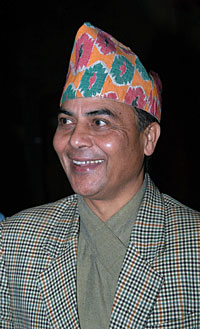A career bureaucrat with the government of Nepal, Bhojraj Pokharel came out of retirement to chair the Election Commission overseeing the CA elections in April 2008. He was recently appointed to a UN Panel to monitor the upcoming self-determination referenda for Southern Sudan and the Abyei area. Nepali Times spoke to Pokharel before he left.
 MIN RATNA BAJRACHARYA |
Nepali Times:Tell us about your recent appointment.
Bhojraj Pokharel: Sudan is home to the longest running conflict in the world. In Southern Sudan alone, two million people have lost their lives, and four million have been displaced. Darfur in Northern Sudan is another hotspot. The Khartoum government and the Sudan People's Liberation Army (SPLA) signed a peace agreement in 2005 which stipulated that Southern Sudan would hold a referendum to decide whether it would remain part of Sudan. Another referendum will be held in Abyei on whether it will remain with Northern Sudan or become a part of Southern Sudan.
The panel will assess the political situation leading up to the referendum on 9 January, use the good offices of the Secretary-General of the UN to build confidence among the parties, and maintain credibility during and after the referendum in order to prevent an adverse environment.
What lessons might be drawn from your own experiences here?
Obviously it's a different context, even though it's also a conflict situation. I can share examples and we can copy the modality of the processes.
President Bashir was charged with war crimes by the International Criminal Court, and there are fears the peace process could break down. How will that affect your work?
There are two parties in the peace process: the SPLA and President Bashir's National Congress Party. We can't have a successful referendum if they don't work together. The rapport international players build with the parties will be important.
You are the first Nepali chosen for a UN panel of this stature. What was your reaction when you first heard the news?
I was delighted that the international community recognised Nepal and thought we might be able to help others in their peace processes. Whether this trust will continue will depend on my work. That is more humbling. There is a huge international interest in Sudan, including superpower interest. Add to this the complexity of Sudan's internal politics, then the work becomes very challenging.
International agencies like the UN are often resented by local actors. Are you worried about that?
There is a gap between understanding and reality. If we talk about UNMIN, there seem to be very few who understand its exact mandate, even among those who write about it. But when we fail at something we are quick to point a finger saying, "What's it monitoring, then?" So the credibility of the organisation isn't just based on its performance, it's also based on perceptions.
A recent report by International Crisis Group said, "Nepal is a dysfunctional state by demand." You were a life-long bureaucrat; are we a lost cause?
When I was at Harvard for a Master's degree last year, I was often asked, "Is Nepal a failed state, or on its way to becoming one?" I said we are not a failed state but we are moving towards the red line, and faster now. But whether we become failed or not depends on how we react.
Does that mean you have lost faith in the peace process?
I am hopeful. In the past, our leaders have always come through at the last minute. The fact is there are no alternatives. I believe that when that moment arrives, the leaders will understand that some will rise and some will get crushed. If they see their decline, they will change their ways. That is the red line I was talking about. I hope we won't fall any further and become a failed state.
Some say there is too much outside interest in Nepal and our politics might no longer be in our hands.
Listen, the happiest day of my life was election day on April 10, when I went to a polling booth and found a long line at 7 in the morning. The outpouring of people made me realise that there was a hunger for peace. But we killed the national aspiration. I didn't even imagine our leaders could act so immaturely.
If I don't look after my house, my neighbours will peek in. If the activities of my household disturb my neighbour, he will be interested. The interest can be one of help or intervention. We still have time but I think we killed the national aspiration for peace, and this makes it easier for other people to be involved.
READ ALSO:
Forcing tasks
Propaganda war, CK LAL
The value of deadwood, DAMAKANT JAYSHI


